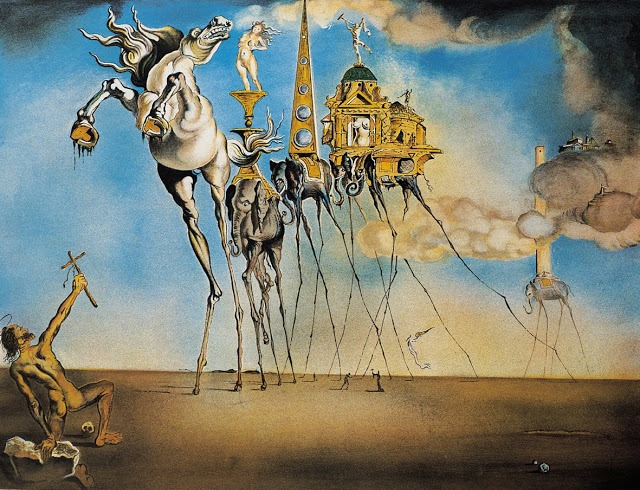The human mind is constructive. We create our world, inside of our own heads. To understand the way that we as individuals think, the way that we construct reality, we have to examine some of the moving parts of the consciousness system that are involved. Some of these parts are cognitive, some emotional; things like abstract reasoning, probability prediction, sampling, grouping, chunking, compartmentalization, and relationship architectures are all necessary to understand how we construct the world around us.
The first and easiest places to examine when talking about the functioning of consciousness are the senses. Foremost is sight, simply because we have more built-in equipment for sight than any of the other sense. We fill in the blanks with out eyes, sometimes seeing things that aren’t there to make sense of patterns. Then sound, which is continually processed; touch, which is a pressure system that is built to feel things outside, but simultaneously internalize them as part of ourselves, such as hugs, touching which releases oxytocin, kissing, etc. The senses construct the mental world inside of our brains and allow us to interact with it.
We also construct socially. We imagine what others may think about us, or even what others may be doing in comparison to our own activities. There is also a an imagined hierarchy that normally forms due to various reasons; usually strength is a deciding factor. We have groups of people that we consider to be part of us, clicks, friend groups, religious communities, etc. This helps to give us a sense of worth by belonging to something, which is why community is such an important aspect of healthy living.
Humans also have a sometimes tragic flaw, called hubris, or pride. We believe ourselves to have accomplished something when we put forth great effort and achieve desired results, which can lead to a sense of accomplishment. This is most certainly a constructive process where we place a sense of value on ourselves for something that has been completed or finished with our participation. This also provides us with a sense of worth and accomplishment.
Humans also project our judgements onto the things around us, sometimes in terms of morals, sometimes in terms of positive or negative. This gives the object a perceived value and allows us to make judgement calls for very important things (i.e. the quality of food that you eat). This also allows us to manipulate the environment in a positive way for our own circumstances, in a similar way to a bird building a nest. It helps us to survive in a very real way.
Humans also have an ability to reason abstractly to plan. It allows us to save food and other resources during harder times and to effectively project ourselves into the future to deal with our environment. This is probably the reason for our massive success on the planet; we have the ability to forego now for later. This is tremendously valuable in social situations, especially those involving trade and bartering, because we can amass specific resources in an efficient manner to trade them for other valuables. This concept is what originally allowed humans to begin agriculture, which then provided us with free time and the ability to work less because we don’t have to always be focused on survival.
However, this amazing ability to plan also has a dark side; fear, anxiety, and idealization. We always want to hope for the best, even if it is an unreasonable outcome of our current situation. We sometimes create false realities because of our own fears and idealizations which then can cause negative effects. We get anxiety for future situations because of past situations that we have already experienced, or we think we know the outcome of a given situation simply because we have experienced a similar one. Fear is the epitome of this dark side, sometimes leading us to create false realities known as neurosis. But in judgement for survival, fear is absolutely necessary.
Fear is possibly the most constructive aspect of the human mind. It gives us the ability to avoid things we have experienced, to efficiently escape certain environments, and to react effectively when faced with danger. However, in social situations, fear has almost no value and can completely degrade relationships. Have you ever been in a relationship where the other person is overly jealous, or protective? This is a perfect example of a fear that degrades a relationship and that is completely unnecessary until some kind of evidence appears.
Humans can construct completely different realities. You can see this in cultural and religious values, where some people believe that the “right” way to live is what they have been taught; or when someone goes into neurosis because of over-stress, or simply genetic factors combined with the environment. In the modern world, stress is almost always the result of imagined or projected fears, which is why it is such a powerful force in our lives. Our ability to deal with the stress physiologically is almost always dependent upon our beliefs about the stress. Sometimes, this can force us to construct completely different realities to allow us to cope with the stress from the environment.
There are a few other things that we make up to deal with the environment; time, measurements, communities, languages, mathematics, mythologies, religion, and stories. Stories are incredibly fascinating, because they allow us to ‘tap in’ to the experiences of another consciousness through communication with our ability to reason and construct abstractly. This can allow us to learn, without really experiencing anything significant in the environment (of course you are reading a book, which is a part of the environment).
These are some of the different ways that we construct reality within our minds. This is why the concept Maya exists in eastern religions. Fear is an extremely interesting phenomenon in humans, almost certainly one to be avoided in social situations. So while you are out there, remember that YOU are constructing the subjective world that you live in and that it is specific to each individual.

